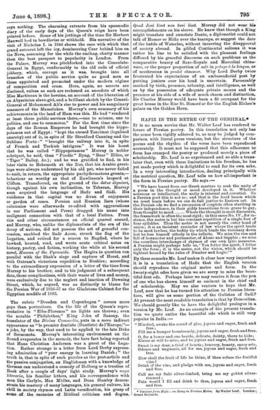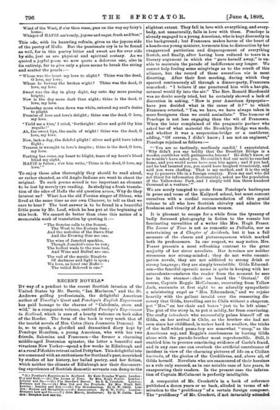HAF1Z IN THE METRE OF THE ORIGINAL'
Jr is no mean service that Mr. Walter Leaf has rendered to lovers of Persian poetry. In this translation not only hae the sense been rigidly adhered to, as may be judged by com- parison with literal prose versions, but the structure of the poems and the rhythm of the verse have been reproduced accurately. It must not be supposed that this adherence to form has cramped the poetry or produced merely a piece of scholarship. Mr. Leaf is so experienced and so able a trans- lator that, even with these limitations to his freedom, he has yet made poetry which is delightful to read for its own sake. In a very interesting introduction, dealing principally with the metrical question, Mr. Leaf tells us how all-important is, the form in Persian poetry. He says :— "We have learnt from our Greek masters to seek the unity of a poem in the thought or mood developed in it. Whether sensuous or intellectual, the unity is internal and essential. To. a Persian poet this is not so ; and that is the hard lesson which we must learn before we can do full justice to Eastern art. In, the Persian ode we find a succession of couplets often startling in their independence, in their giddy transitions from grave to gay, from thought to mood Where the thought is most discursive, the framework is often the most rigid ; in this same No. IV., for in- stance, the metre is but the constant repetition of a single foot of four syllables. Thus the metre is not merely the outer bond of union; it is an insistent reminder of law where the spirit tends to be most lawless, the bodily tie which binds the visionary down lest he lose himself utterly in the infinite. We miss the rise and fall of hexameter and pentameter, of Alcaic and Sapphic ; we miss the countless interchange of rhymes of our own lyric measures. A Persian might perhaps tells us, 'You fetter the spirit, I fetter only the form ; it is the metre, not the vision, which should be tightest bound by the rules of Number and Logic.' "
By these remarks Mr. Leaf makes it clear how very important it is in a translation of Hafiz that the English version should reproduce the original metre and form. In the twenty-eight odes here given we are sorry to miss the beau- tiful first ode. Perhaps later we may receive it from the pen of one who has shown himself so eminent in the chief end of scholarship. May we also venture to hope that Mr. Leaf, now that he has turned his attention to Persian litera- ture, will give us some portion of the Gulistan of Sadi P At present the most readable translation is that by Demoulins. We should greatly like to have the delightful prologue in a version by Mr. Leaf. As an example of the present transla- tion we quote entire the beautiful ode which is still very popular in India :—
"Minstrel, awake the sound of glee, joyous and eager, fresh and free ; Fill me a bumper bounteously, joyous and eager, fresh and free.
0, for a bower and one beside, delicate, dainty, there to hide; Kisses at will to seize, and be joyous and eager, fresh and free.
Sweet is my dear, a thief of hearts ; bravery, beauty, saucy arts, Odours and unguents, all for me, joyous and eager, fresh and free.
How shall the fruit of life be thine, if thou refuse the fruitful ine ?
Drink of the vine, and pledge with me, joyous and eager, fresh and free.
Call me my Saki silver-limbed, bring me my goblet silver- rimmed •
Fain would I fill and drink to thee, joyous and eager, fresh and free.
• Vorriong from Hafts an Essay in Persian Metro. By Walter Leif. London : Grant Richards.
Wind of the West, if e'er thou roam, pass on the way my fairy's home; 'Whisper of HAFIZ am'rously, joyous and eager, fresh and free."
This ode, with its haunting refrain, gives us the joyous side of the poetry of Hafiz. But the passionate cry is to be found
as well, for in this poetry bitter and sweet are for ever side by aide, just as are physical and spiritual ecstasy. As we quoted a joyful poem we now quote a dolorous one, also in its entirety, for to give only a piece seems to break the string and scatter the pearls
Whose was the heart my love to slight ? Thine was the deed, 0 love, my love ; Whose to bewray the broken wight ? Thine was the deed, 0 love, my love, sweet was the day in glory dight, day unto day more passing bright; Now is the day more dark than night ; thine is the deed, 0 love, my love.
'Yesterday morn when dawn was white, entered my soul's desire to plight Promise of love and love's delight ; thine was the deed, 0 love, my love.
'Yield me a kiss,' I cried, 'forthright ! silver and gold thy kiss requite !' Ah, the sweet lips, the smile of might ! thine was the deed, 0 love, my love.
Now, lack-a-day, the doleful plight ! silver and gold have taken flight ; Treason is wrought in love's despite ; thine is the deed, 0 love, my love.
Parting has come, ray heart to blight, tears of my heart's blood blind my sight. IIA.FIZ is fallen ; o'er him write,' Thine is the deed, 0 love, my love.'"
To enjoy these odes thoroughly they should be read aloud, or rather chanted, as old Anglo-Indians are wont to chant the 'original. To such poems sound is too important an element to be lost by merely eye reading. In studying a fresh transla- tion of the odes of Ha.fiz the old question arises, Why do they interest us? What has the old Persian singer of Shiraz, who lived at the same time as our own Chaucer, to tell us that we care to hear P The best answer is to be found in a beautiful little poem by Mr. Leaf, which he has put at the beginning of this book. We cannot do better than close this notice of a memorable work of translation by quoting it :—
" The Sunrise calls to the Sunset, The West to the Eastern Sun ; And the melodies of the Dawn-Star And the Evening Star are one.
The wine of Jamshid sparkles,
Though Jamshid's race be run ; The bulbul wails to the rose-bud, And Wine and Bulbul are one.
The veil of the mystic Ringlets Of darkness and light is spun ; We love, as loved our Hafiz- The veiled Beloved is one."



































 Previous page
Previous page